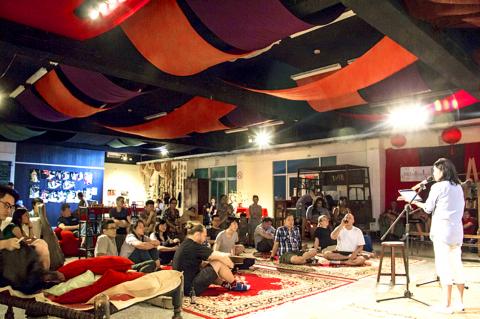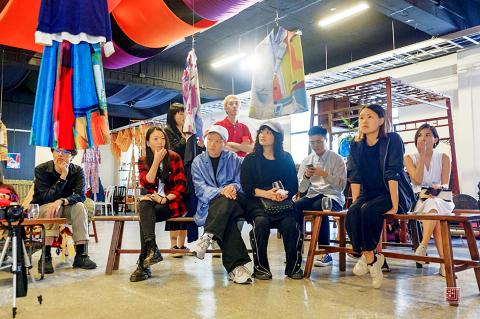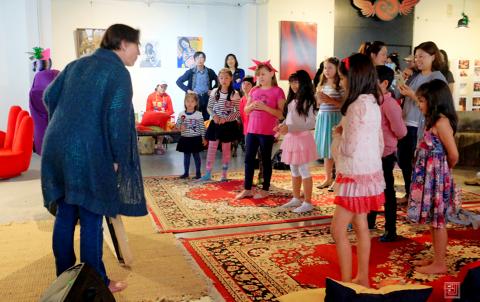The Red Room is marking its eighth anniversary this month with 8Fest: four days of fun, creativity and sharing in Taipei, spread out over two weekends, starting on Saturday.
The founders, supporters and followers of Red Room certainly have reason to celebrate, for what began as a once-a-month gathering to share and support a love for the written word and musical talent has become a non-profit organization with an ever-growing schedule of events and a home at the Taiwan Air Force Innovation Base.
The Red Room is the fruit of one of the most devastating typhoons to ever hit Taiwan: Morakot, which ravaged southern Taiwan in early August 2009.

Photo courtesy of Eann
A chance encounter during a post-typhoon clean-up effort in Taitung County between Taipei-raised singer Ayesha Mehta and entrepreneur Ping Chu (朱平) and their discussion about poetry and literature-reading nights and a desire to create a space for sharing led to the first Stage Time and Wine@Red Room event three months later.
Word of mouth and posters encouraged people to bring something they had written or read, or instruments to play, to share — in five-minute allotments — with others.
The once-a-month Saturday night events, in a space provided by Ping — under whose Ripplemaker Foundation the Red Room is now a registered entity — have become a cross-cultural hub that attracts Taiwanese and foreigners, both short-term visitors and long-term expatriates.

Photo courtesy of Eann
The key to the Red Room success are that it is volunteer-organized and community driven, fueled by the desire to share and to support creativity, and perhaps most importantly, to listen.
Each expansion over the years has been created by the people who attended Stage Time and Wine events and were motivated to help do something more: a time and place for children to share their creativity (Stage Time & Juice), invitation-only curated performance evenings (Aside@Red Room), a readers’ theater (Red Room Radio Redux) and art exchanges (Visual Dialogues).
Just as Red Room has grown exponentially, so have birthday parties.

Photo courtesy of JJ Chen
This year’s party is divided into four sections: “Articulate” on Saturday, “Narrate” on Sunday, “Create” on Nov. 25 and “Elevate” on Nov. 26.
“Articulate,” which aims to show the potential of audience-turned-performer events, consists of two parts: Stage Time & Juice for children (and their parents) aged five to 18 from 2pm to 5pm and Crimson Octopus (赤紅八爪魚) from 6:30pm to 10pm, a collaborative performance by randomly assigned groups of people who have to come up with an eight to 10-minute work.
“Narrate,” which runs from 2pm to 9pm, has six events aimed at bringing together publishers, speakers and the public: a book fair; a salon that will host discussions in Mandarin and English on immigration law, the cultural identity of Taiwan’s Indigenous peoples and a holistic look at a sustainable ecosystem; three panel discussions — “How to Move Forward in Taiwan (如何在台灣前進) from 2pm to 3pm, “Mother Island: a Talk on Indigenous Culture Today (母親島嶼:現今原住民文化的對話) from 4pm to 5pm and “Think East Grow Regenerate (思、食、農、再生) from 6pm to 7pm — a screening of the documentary Apology & Justice: Voices from Taiwan (道歉與正義:台灣之聲) that begins at 3:15pm and a performance, A Tale of Two People (兩個人的故事), that begins at 5:15pm.
“Create,” the fifth “Artists Bridge the Gap,” is a day of live painting and music that begins at 11am and ends at 10pm.
“Elevate” is aimed at blending cultures and art forms and encouraging creativity with a workshop for children, a workshop on creative journaling, an “Art Explosion” workshop and a fashion show with live music that will feature the work of young designers using “upcycled” materials, including Meghna Nayak, whose LataSita line is based in Kolkata, India.
All of the 8Fest events are at the Red Room International Village, Taipei Air Force Innovation Base (空總創新基地), 177, Jianguo S Rd Sec 1, Taipei City (台北市建國南路一段177號).
While many of the activities are free, there are patronage charges for the workshops, performances and the fashion show and some events require advance registration — such as those who want to participate in the Crimson Octopus.
Registration details, prices and more information on 8Fest can be found on the Web at redroomtaipei.com.
This story has been amended since it was first published to correct the spelling of LataSita.

Dissident artist Ai Weiwei’s (艾未未) famous return to the People’s Republic of China (PRC) has been overshadowed by the astonishing news of the latest arrests of senior military figures for “corruption,” but it is an interesting piece of news in its own right, though more for what Ai does not understand than for what he does. Ai simply lacks the reflective understanding that the loneliness and isolation he imagines are “European” are simply the joys of life as an expat. That goes both ways: “I love Taiwan!” say many still wet-behind-the-ears expats here, not realizing what they love is being an

Google unveiled an artificial intelligence tool Wednesday that its scientists said would help unravel the mysteries of the human genome — and could one day lead to new treatments for diseases. The deep learning model AlphaGenome was hailed by outside researchers as a “breakthrough” that would let scientists study and even simulate the roots of difficult-to-treat genetic diseases. While the first complete map of the human genome in 2003 “gave us the book of life, reading it remained a challenge,” Pushmeet Kohli, vice president of research at Google DeepMind, told journalists. “We have the text,” he said, which is a sequence of

Every now and then, even hardcore hikers like to sleep in, leave the heavy gear at home and just enjoy a relaxed half-day stroll in the mountains: no cold, no steep uphills, no pressure to walk a certain distance in a day. In the winter, the mild climate and lower elevations of the forests in Taiwan’s far south offer a number of easy escapes like this. A prime example is the river above Mudan Reservoir (牡丹水庫): with shallow water, gentle current, abundant wildlife and a complete lack of tourists, this walk is accessible to nearly everyone but still feels quite remote.

It’s a bold filmmaking choice to have a countdown clock on the screen for most of your movie. In the best-case scenario for a movie like Mercy, in which a Los Angeles detective has to prove his innocence to an artificial intelligence judge within said time limit, it heightens the tension. Who hasn’t gotten sweaty palms in, say, a Mission: Impossible movie when the bomb is ticking down and Tom Cruise still hasn’t cleared the building? Why not just extend it for the duration? Perhaps in a better movie it might have worked. Sadly in Mercy, it’s an ever-present reminder of just